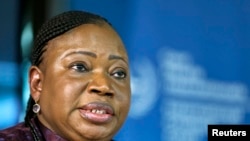The President of the Assembly of States Parties to the Rome Statute of the International Criminal Court (ICC) says members of the group will start a one-week annual meeting beginning Wednesday at The Hague.
The Assembly of States Parties is a body that administers management oversight over the ICC.
Ambassador Tiina Intelmann says high on the agenda will be a discussion on the immunity from prosecution of sitting heads of state. It’s an important issue to some members who say current leaders should not be prosecuted for crimes against humanity.
“This year we will focus on how the court addresses and helps victims, also on the issue of cooperation and also on complementarity,” said Intelmann. “African states parties have asked us to put a particular item on the agenda, the indictment of a sitting head of state, and the consequences of that situation to peace and security and looking into developments and implications.”
Intelmann’s comments followed last week attempt by some African countries to have the UN Security Council defer for a year the ICC trial of Kenya’s President Uhuru Kenyatta and his deputy William Ruto. The court has accused both leaders of playing key roles in the country’s 2007-2008 post-election violence. The violence left about 1300 dead and thousands displaced.
One hundred twenty-two countries are parties to the Rome Statute that established the ICC. Africa is the biggest contributor with 34 members representing about 40 percent of the state parties.
“I have consistently called all states parties to be present, and if there are issues to be discussed it is better that everybody is present,” said Intelmann. “I hope that we will come out of this discussion much stronger and that we will look … at ways of improving the system so that it meets the expectations of all states and at the same time reinforces our resolve to fight against impunity.”
Critics of the court have often said that the ICC targets African countries since a majority of the cases being prosecuted deals with leaders from the continent. They cite as evidence the indictment of Sudanese President Omar Hassan Al-Bashir as well as the trial of Kenya’s President Kenyatta and his deputy Ruto.
Intelmann disagreed that the ICC solely targets Africans.
“I will not be totally in agreement with those who say that we are targeting Africans. Mostly these cases have all been referred to [the ICC] by the states themselves,” said Intelmann.
She said African countries that have referred cases to the court include Uganda, Comoros Islands, Central African Republic, the Democratic Republic of Congo (DRC), and Mali.
“I hope that the states where the court is working at the request of the states themselves are appreciating the effort that is being done to investigate [crimes],” said Intelmann.
The Assembly of States Parties is a body that administers management oversight over the ICC.
Ambassador Tiina Intelmann says high on the agenda will be a discussion on the immunity from prosecution of sitting heads of state. It’s an important issue to some members who say current leaders should not be prosecuted for crimes against humanity.
“This year we will focus on how the court addresses and helps victims, also on the issue of cooperation and also on complementarity,” said Intelmann. “African states parties have asked us to put a particular item on the agenda, the indictment of a sitting head of state, and the consequences of that situation to peace and security and looking into developments and implications.”
Intelmann’s comments followed last week attempt by some African countries to have the UN Security Council defer for a year the ICC trial of Kenya’s President Uhuru Kenyatta and his deputy William Ruto. The court has accused both leaders of playing key roles in the country’s 2007-2008 post-election violence. The violence left about 1300 dead and thousands displaced.
One hundred twenty-two countries are parties to the Rome Statute that established the ICC. Africa is the biggest contributor with 34 members representing about 40 percent of the state parties.
“I have consistently called all states parties to be present, and if there are issues to be discussed it is better that everybody is present,” said Intelmann. “I hope that we will come out of this discussion much stronger and that we will look … at ways of improving the system so that it meets the expectations of all states and at the same time reinforces our resolve to fight against impunity.”
Critics of the court have often said that the ICC targets African countries since a majority of the cases being prosecuted deals with leaders from the continent. They cite as evidence the indictment of Sudanese President Omar Hassan Al-Bashir as well as the trial of Kenya’s President Kenyatta and his deputy Ruto.
Intelmann disagreed that the ICC solely targets Africans.
“I will not be totally in agreement with those who say that we are targeting Africans. Mostly these cases have all been referred to [the ICC] by the states themselves,” said Intelmann.
She said African countries that have referred cases to the court include Uganda, Comoros Islands, Central African Republic, the Democratic Republic of Congo (DRC), and Mali.
“I hope that the states where the court is working at the request of the states themselves are appreciating the effort that is being done to investigate [crimes],” said Intelmann.









